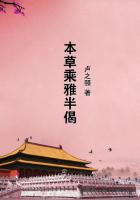I MUST try to convey some notion of our life, of how the days passed and what pleasure we took in them, of what there was to do and how we set about doing it, in our mountain hermitage.The house, after we had repaired the worst of the damages, and filled in some of the doors and windows with white cotton cloth, became a healthy and a pleasant dwelling-place, always airy and dry, and haunted by the outdoor perfumes of the glen.Within, it had the look of habitation, the human look.You had only to go into the third room, which we did not use, and see its stones, its sifting earth, its tumbled litter; and then return to our lodging, with the beds made, the plates on the rack, the pail of bright water behind the door, the stove crackling in a corner, and perhaps the table roughly laid against a meal, - and man's order, the little clean spots that he creates to dwell in, were at once contrasted with the rich passivity of nature.And yet our house was everywhere so wrecked and shattered, the air came and went so freely, the sun found so many portholes, the golden outdoor glow shone in so many open chinks, that we enjoyed, at the same time, some of the comforts of a roof and much of the gaiety and brightness of al fresco life.Asingle shower of rain, to be sure, and we should have been drowned out like mice.But ours was a Californian summer, and an earthquake was a far likelier accident than a shower of rain.
Trustful in this fine weather, we kept the house for kitchen and bedroom, and used the platform as our summer parlour.
The sense of privacy, as I have said already, was complete.
We could look over the clump on miles of forest and rough hilltop; our eyes commanded some of Napa Valley, where the train ran, and the little country townships sat so close together along the line of the rail.But here there was no man to intrude.None but the Hansons were our visitors.
Even they came but at long intervals, or twice daily, at a stated hour, with milk.So our days, as they were never interrupted, drew out to the greater length; hour melted insensibly into hour; the household duties, though they were many, and some of them laborious, dwindled into mere islets of business in a sea of sunny day-time; and it appears to me, looking back, as though the far greater part of our life at Silverado had been passed, propped upon an elbow, or seated on a plank, listening to the silence that there is among the hills.
My work, it is true, was over early in the morning.I rose before any one else, lit the stove, put on the water to boil, and strolled forth upon the platform to wait till it was ready.Silverado would then be still in shadow, the sun shining on the mountain higher up.A clean smell of trees, a smell of the earth at morning, hung in the air.Regularly, every day, there was a single bird, not singing, but awkwardly chirruping among the green madronas, and the sound was cheerful, natural, and stirring.It did not hold the attention, nor interrupt the thread of meditation, like a blackbird or a nightingale; it was mere woodland prattle, of which the mind was conscious like a perfume.The freshness of these morning seasons remained with me far on into the day.
As soon as the kettle boiled, I made porridge and coffee; and that, beyond the literal drawing of water, and the preparation of kindling, which it would be hyperbolical to call the hewing of wood, ended my domestic duties for the day.Thenceforth my wife laboured single-handed in the palace, and I lay or wandered on the platform at my own sweet will.The little corner near the forge, where we found a refuge under the madronas from the unsparing early sun, is indeed connected in my mind with some nightmare encounters over Euclid, and the Latin Grammar.These were known as Sam's lessons.He was supposed to be the victim and the sufferer; but here there must have been some misconception, for whereas I generally retired to bed after one of these engagements, he was no sooner set free than he dashed up to the Chinaman's house, where he had installed a printing press, that great element of civilization, and the sound of his labours would be faintly audible about the canyon half the day.
To walk at all was a laborious business; the foot sank and slid, the boots were cut to pieces, among sharp, uneven, rolling stones.When we crossed the platform in any direction, it was usual to lay a course, following as much as possible the line of waggon rails.Thus, if water were to be drawn, the water-carrier left the house along some tilting planks that we had laid down, and not laid down very well.
These carried him to that great highroad, the railway; and the railway served him as far as to the head of the shaft.
But from thence to the spring and back again he made the best of his unaided way, staggering among the stones, and wading in low growth of the calcanthus, where the rattlesnakes lay hissing at his passage.Yet I liked to draw water.It was pleasant to dip the gray metal pail into the clean, colourless, cool water; pleasant to carry it back, with the water ripping at the edge, and a broken sunbeam quivering in the midst.
But the extreme roughness of the walking confined us in common practice to the platform, and indeed to those parts of it that were most easily accessible along the line of rails.
The rails came straight forward from the shaft, here and there overgrown with little green bushes, but still entire, and still carrying a truck, which it was Sam's delight to trundle to and fro by the hour with various ladings.About midway down the platform, the railroad trended to the right, leaving our house and coasting along the far side within a few yards of the madronas and the forge, and not far of the latter, ended in a sort of platform on the edge of the dump.
There, in old days, the trucks were tipped, and their load sent thundering down the chute.There, besides, was the only spot where we could approach the margin of the dump.















